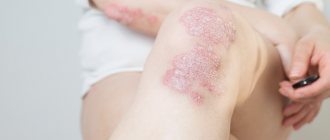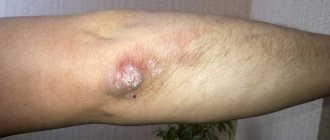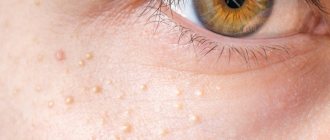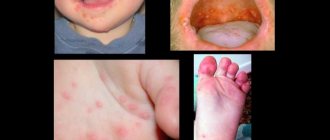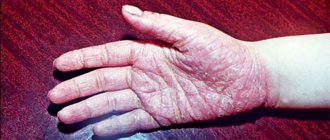Causes of psoriasis in the ears
Despite the active study of psoriasis, even today scientists have not been able to determine the cause of the disease. The most common triggers for pathology are:
- suffered a severe infection;
- stress, strong emotional experience;
- overwork;
- incorrect use of certain medications;
- alcohol abuse;
- unbalanced diet;
- injury to the tissues of the auditory canal;
- allergic reactions to household substances;
- frequent contact with water and others.
Treatment
Having determined the diagnosis, you need to immediately carry out therapy. The prescription for psoriasis is determined by a dermatologist separately for each person. When choosing medications, the specialist takes into account some important factors - the clinical picture, the extent of skin damage, the patient’s age, the duration of the disease and general condition.
Self-medication is dangerous with complications!
Attention
Despite the fact that our articles are based on trusted sources and have been tested by practicing doctors, the same symptoms can be signs of different diseases, and the disease may not proceed according to the textbook.
Pros of seeing a doctor:
- Only a specialist will prescribe suitable medications.
- Recovery will be easier and faster.
- The doctor will monitor the course of the disease and help avoid complications.
find a doctor
Do not try to treat yourself - consult a specialist.
Treatment of ear psoriasis should be comprehensive. Medications alone are unlikely to help. Although this dermatological pathology does not lead to deafness, it should not be left to chance.
Medications
Therapeutic methods are aimed at eliminating symptoms. Drug treatment of psoriatic plaques involves:
- Antibacterial agents - used in the formation of erosions and cracks, where infection can occur or during exacerbation of pathology.
- Vitamins , minerals - to normalize the immune system, as well as vitamin-containing ointments and creams.
- Hormonal corticosteroid drugs are consumed in parallel with salicylic acid-based drugs; For skin regeneration, medications containing calcipotriol are used. They relieve inflammation and other symptoms of psoriasis.
- Keratolytics – help soften, moisturize and further eliminate plaques.
- Antihistamines – relieve itching, redness and irritation of the skin.
- anti-inflammatory - have antifungal, antipruritic, analgesic effects.
- Antidepressants (available by prescription only) are prescribed when a psychological disorder manifests itself, usually caused by discomfort, severe itching, or a burning sensation in the ear.
- The use of monoclonal antibodies restores the mechanism of cell division. Currently, it is a popular method of eliminating this disease.
Diet for psoriasis
Psoriasis is a chronic, non-infectious disease that has many types and forms, accompanied by various symptoms.
In addition, patients with psoriasis of the auricle are prescribed enterosorbents and hepatoprotectors for oral use.
To cure the disease faster, you should provide open access to the damaged skin to clean air and sun.
How to apply medications
Properly selected treatment for ear psoriasis will help cope with pain and discomfort. The drugs will protect the skin from further irritation.
How to apply the product correctly:
- ointment, cream or gel must be smeared into the desired area with clean hands;
- apply them to the damaged area in a thick layer; when it is necessary to treat the surface of the ear, use a cotton swab; if from inside the passage - a cotton pad;
- After performing the procedure, you should wait 20 minutes, only after that go to bed or put on a hat, because the product will be erased.
For psoriatic disease behind the ears, it is helpful to jointly lubricate the outer part that is close to the affected area.
Physiotherapy
In addition to treatment with medications, physical procedures provide good results:
- Herbal medicine involves the effect of ultraviolet rays on areas of inflammation.
- Laser therapy is intended to normalize metabolic processes in the damaged area.
It is worth noting that this pathology does not tolerate amateur activity. Treating ear psoriasis requires a comprehensive and knowledgeable approach. Self-therapy will complicate the situation.
What does it look like?
Psoriasis in the ears is characterized by the formation of papules. Their surface quickly becomes red, peels off, and if you scrape off part of the formation, a thin film with small drops of blood appears. The damaged area begins to hurt and becomes covered with scales again.
The following symptoms are typical for ear psoriasis:
- characteristic rashes on the lobe, the outer part of the auricle, in the ear canal;
- noise in ears;
- itching and redness of the skin;
- discharge with an unpleasant odor;
- facial pastiness;
- feeling of tightness of the skin behind the ear.
If left untreated, papules can spread to other areas of the skin: chin, nasolabial fold, cheeks, neck.
Diagnostics
Psoriasis usually develops quickly. And since at the beginning of the disease it is difficult to determine the cause, in order not to trigger it, patients are prescribed drug treatment. It helps prevent subsequent development.
Why can our articles be trusted?
We make health information clear, accessible and relevant.
- All articles are checked by practicing doctors.
- We take scientific literature and the latest research as a basis.
- We publish detailed articles that answer all questions.
To correctly establish a diagnosis, it is necessary:
- conduct a laboratory analysis of intestinal microflora;
- scrape off the psoriatic plaque - a stearin stain should appear;
- peel off the scales - the terminal film will be visible there, and if it is damaged, drops of blood will appear.
The main thing is to establish the cause of psoriasis, otherwise a relapse will occur very soon.
Consequences of psoriasis in the ears
If the patient refuses treatment for a long time, this will inevitably provoke complications of psoriasis in the ears, such as:
- severe inflammation, infection penetration deep into the ear canal;
- deep injuries in the ears;
- hearing impairment;
- generalization of the process - the rash can cover all other parts of the body;
- the appearance of so-called keratonic hair cylinders. They will be freely removed from the head if accidentally touched or combed.
Hygiene features
When performing treatment for psoriasis, you need to adhere to simple hygiene rules:
- everyday water manipulations should not cause injury to the affected areas;
- dry all areas thoroughly but with caution; Do not rub the skin until it turns red;
- inflammatory foci must be treated with special preparations;
- if psoriatic plaques are located in the middle of the ear, they need to be cleaned with cotton swabs (in no case by inserting them deeply, this can lead to blockage);
- It is advisable to pin or cut your hair, since it is important for ultraviolet radiation to reach the diseased areas (metabolic processes are activated to renew the skin);
- when psoriasis worsens, various effects on the hair can provoke complications, so it is better to shorten the hair (so that it can be combed without difficulty);
- during illness , you should not use a hairdryer or keep it at a distance of at least 30 cm;
- Any cosmetic procedures (hair coloring, perm) are prohibited.
PUVA therapy for psoriasis
PUVA therapy is one of the physiotherapeutic methods used to treat psoriasis.
Avoid scratching the affected area to avoid risk of infection.
It is very important for a patient with psoriasis to maintain hygiene and eliminate bad habits. For severe itching, antiallergic medications may be used.
Prevention
Prevention of ear disease is, first of all, paying close attention to yourself and your body. It is important to monitor your health, build a proper diet, avoid stress and overload, and treat chronic diseases in a timely manner.
We hope that our story about ear psoriasis will be purely informational for you. And if you suffer from plaques on your body, try Rederm ointment with a combination of betamethasone and salicylic acid. The product has a complex effect:
- softens and exfoliates rough skin;
- relieves redness and inflammation;
- eliminates itching;
- reduces allergic manifestations.
Preventive measures
Prevention of the disease requires compliance with simple rules. Firstly, you need to protect your nervous system, because stress factors can trigger psoriasis. Secondly, it is necessary to strengthen the immune system and lead a healthy lifestyle:
- exclude fried, salty, fatty foods from the diet and eat healthy;
- do not smoke or drink alcohol, as this may worsen symptoms;
- take care of your skin - avoid frostbite, prolonged exposure to the scorching sun, avoid mechanical damage;
- wear underwear made from natural fabrics.
Risk factors that provoke the development of the disease
In the medical environment, there are usually several characteristic factors that can trigger the process. Moreover, the risk of developing the disease increases if there is a combination of several provoking factors. These include:
- Genetic predisposition. Scientists put forward the theory that the carriers of the disease are certain types of genes that affect the functioning of the immune system and immune cells of T-lymphocytes. For this reason, parents who suffer from psoriasis are likely to have a child who will also be susceptible to this disease.
- Dry, thin skin. Numerous studies have established a connection between skin characteristics and the risk of developing psoriasis. It turned out that people with thin and dry skin are more likely to suffer from this disease. The reason, as researchers believe, lies in the insufficient production of sebum, which acts as a natural moisturizer for the surface of the body, as well as in the structural features of epidermal cells.
- Impact of the external environment. A significant role in the increase in the number of people suffering from this disease can be played by the use of various cosmetic products and household chemicals, which often contain alcohols, solvents, surfactants and other aggressive components. These substances disrupt the natural functions of the skin, can cause irritation and lead to exacerbation of psoriasis.
- Excessive body hygiene. Pathological obsession with cleanliness also plays a cruel joke on people. The more active, intense and frequent you cleanse your skin, the more damage you can cause to it. Due to frequent use of soap when taking a bath or shower, the protective lipid layer of the skin is destroyed, this leads to the formation of microdamages on the surface, which can subsequently provoke an exacerbation or worsening of psoriasis.
- Unhealthy Lifestyle. Alcohol, smoking, constant stress, poor-quality and unbalanced nutrition, lack of normal rest and sleep - all this inevitably affects human health. It has been noted that certain foods, such as tomatoes and eggplants, as well as alcohol and smoking can worsen psoriasis.
- Immunodeficiencies. Decreased immunity, especially in HIV-positive patients, provokes skin problems and leads to exacerbation of psoriasis symptoms.
- Drug therapy. Taking certain medications can trigger the development of the disease. Beta-blockers, antidepressants, as well as drugs against malaria and seizures should be used with particular caution.
- Concomitant infections. In medical practice, many cases have been described in which signs of psoriasis develop in patients after skin damage by a fungus or as a result of a streptococcal infection.
- Changes in usual living conditions. Climate change, changes in time zones, and seasons have a negative impact on the general well-being of people. During periods of change in living conditions and environment, the body weakens, which opens the way for the development of various diseases.
- Impact of stress. Emotional and nervous tension, physical activity, disruption of work and rest schedules are some of the factors that provoke the appearance of the first symptoms of psoriasis.
- Injury to the skin. Prolonged scratching, friction, and pressure on the skin can cause microdamages and injuries. In certain situations, they can transform into characteristic psoriatic plaques.

